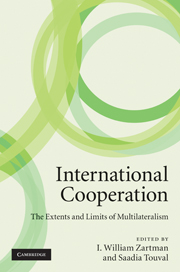Book contents
- Frontmatter
- Contents
- List of figures
- List of tables
- List of contributors
- Acknowledgements
- 1 Introduction: return to the theories of cooperation
- Part 1 Multilateral meanings of cooperation
- 2 Debating cooperation in Europe from Grotius to Adam Smith
- 3 The two sides of multilateral cooperation
- 4 Deconstructing multilateral cooperation
- 5 Negotiated cooperation and its alternatives
- Part 2 Multiple strategies of cooperation
- Bibliography
- Index
4 - Deconstructing multilateral cooperation
Published online by Cambridge University Press: 05 June 2012
- Frontmatter
- Contents
- List of figures
- List of tables
- List of contributors
- Acknowledgements
- 1 Introduction: return to the theories of cooperation
- Part 1 Multilateral meanings of cooperation
- 2 Debating cooperation in Europe from Grotius to Adam Smith
- 3 The two sides of multilateral cooperation
- 4 Deconstructing multilateral cooperation
- 5 Negotiated cooperation and its alternatives
- Part 2 Multiple strategies of cooperation
- Bibliography
- Index
Summary
International cooperation can take many forms, some of which are highly institutionalized forms of cooperation, others of which are not. One of the most discussed – and controversial – form of institutionalized cooperation is “multilateralism.” At its heart, the concept of “multilateralism” rests on the relatively simple notion that when three or more states choose to cooperate it is with the expectation that their cooperative arrangement will yield roughly equal reciprocal benefits. For example, when three or more states agree to an alliance partnership it is with the expectation that the security guarantees they offer to each will be reciprocated – that is, an attack by a hostile force against one of the members of the alliance will rally the others to its defense.
Ambrose Bierce's definition of a Hydra – as a kind of animal that the ancients catalogued under many heads – captures some of the definitional quandaries associated with the concept. “Multilateral” literally means “many sided.” It is typically used as an adjective, not a noun or a verb. “Multilateralism,” however, is a noun – but a noun to describe what? A set of belief systems about how the world should be organized? A set of norms or principles for action that are informed by the expectation of reciprocity? A description of different kinds of world order? A description about international institutions and how they should operate? A description of international negotiation processes? A surrogate for “international regimes?”
- Type
- Chapter
- Information
- International CooperationThe Extents and Limits of Multilateralism, pp. 60 - 77Publisher: Cambridge University PressPrint publication year: 2010
- 2
- Cited by



